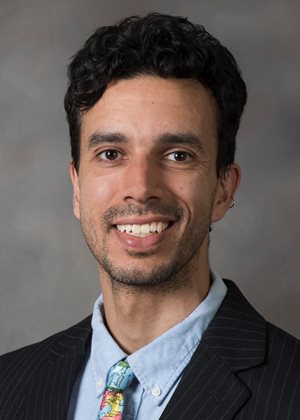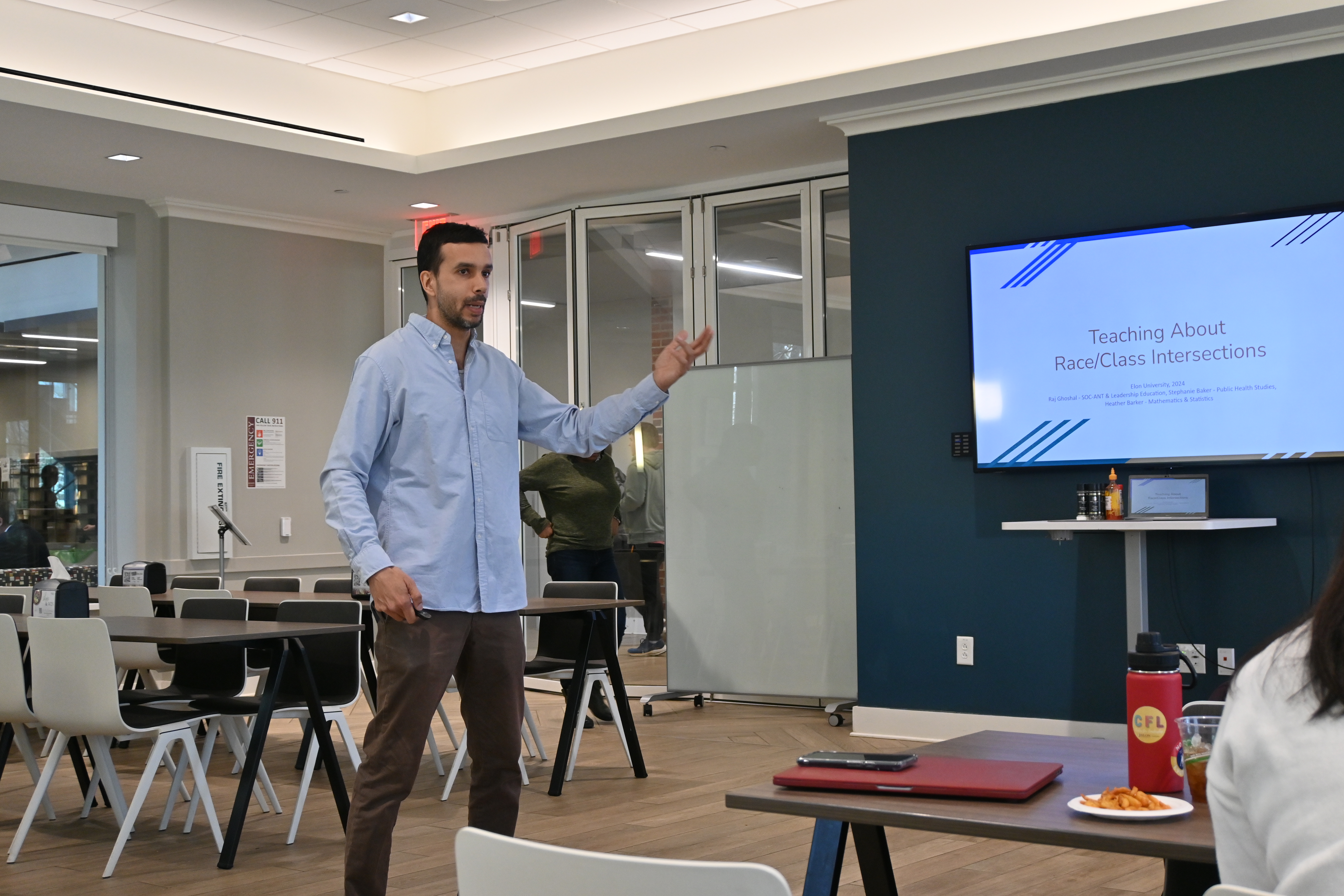Raj Ghoshal, faculty fellow for leadership, discusses his efforts to help faculty integrate leadership education into academic, administrative, and student realms, fostering a culture of inclusive leadership at Elon University.
Raj Ghoshal, faculty fellow for leadership education, describes himself as a liaison between student life, administration and academic spaces. In this role, he hopes to promote a vision of leadership that is inclusive, collaborative and relational, while helping faculty and students integrate leadership learning in the classroom.
“A major part of my job is to help faculty start to understand how leadership can be integrated into any academic field, beyond leadership studies. I also help faculty recognize that we have all this student energy around wanting to learn and engage in leadership – so how do we pull that into the classroom? How do we build some good synergy there?” said Ghoshal, an associate professor of sociology.

One avenue for achieving this goal is through the Faculty Scholars Program, which provides workshops and programs for faculty to enhance their syllabi and integrate leadership education into their courses. The program selects five faculty members from different disciplines who are each awarded a stipend to attend six workshops throughout the academic year. Throughout the program, faculty members work on incorporating leadership education into their classes, identifying opportunities to infuse leadership principles into their syllabi and teaching methods. At the end of the year, faculty members showcase their revised course materials and share their experiences with colleagues.
Another avenue that Ghoshal’s goal is achieved through is fostering partnerships with university stakeholders, such as the Center for Leadership and the Leadership Studies Minor Advisory Board, to ensure that they are in sync and working to promote each other’s goals. Through these efforts, Ghoshal aims to further the university’s commitment to nurturing well-rounded leaders equipped with the skills to thrive in a diverse and dynamic world.
Ghoshal’s journey into this role as the faculty fellow for leadership education stems from his background as a sociology professor. With nearly 15 years of experience in the field, his primary research focus has been on race and class inequality in the United States. This background helps him bring a unique perspective to the study of leadership.
“I think that sociology has a lot to bring to the study of leadership. Sociology is all about human relations and how people work together and how people fit together,” Ghoshal expressed.
In recent years, there has been a growing need to incorporate DEI principles into leadership education, considering the social climate. Additionally, societal shifts have required greater awareness and accountability. However, Ghoshal’s expertise positions him as a valuable resource, offering insights and strategies for implementing inclusive leadership practices.
“Organizations have rightfully become more attentive to understanding human differences and inequalities in the last five years or so. Artificially restricting leadership to one small, homogeneous set of the population and expecting everyone else to follow them is not a recipe for continued success. Having somebody with a background in how people of many different backgrounds can work together made sense for bringing in some tools and approaches from social science disciplines that hadn’t been featured as prominently before,” Ghoshal said.
However, these practices and principles influence far beyond the classroom. This ideology is embedded in the very root of university culture. Elon prepares students to become active and engaged citizens by equipping them with the skills, knowledge, and mindset needed to thrive in a rapidly evolving world. Through experiential learning opportunities, such as community-based projects and internships, students can apply their leadership skills in real-world contexts, making meaningful contributions to society while honing their abilities as ethical leaders.
“The idea of being a leader carries some currency in our culture. If we can share with students what has been learned in the past 70 years of leadership studies, it can help students more quickly move away from some of the dysfunctional and destructive versions of leadership that held sway in earlier decades,” Ghoshal said.
Another way Elon provides opportunities for leadership education is through the Leadership experiential learning requirement (ELR). Undergraduate students are required to complete two ELRs to graduate through one of the five Elon Experiences, which includes leadership. Faculty can submit a proposal to teach classes that have a leadership education component, or students can submit a proposal to have a course approved to fulfill the ELR requirement. Ghoshal discussed some examples of courses that achieve the leadership ELR requirement.
Assistant Professor Pratheep Paranthaman teaches a course in collaborative video game design. “His focus on leadership education is on students working in teams within the class through a structured set of exercises, learning different collaborative processes for video game design that may be relevant in workplaces if they end up working in programming or working as game designers,” Ghoshal stated.
As initiatives such as the Faculty Scholars program and the Leadership ELR continue to thrive at the university, Ghoshal and other campus partners actively measure their effectiveness through different key performance indicators, such as the number of faculty applying to participate in the scholar’s program, the number of applications for the leadership ELR, and the number of students participating in the leadership experience.
Ghoshal has recently launched two projects aimed at expanding Elon community members’ access to leadership education initiatives and resources. The first is a series of talks called “Leading for Equity,” a collaboration between Leadership Education, the Provost’s Office and the Office of Inclusive Excellence that features speakers on topics at the intersection of leadership, equity, and pedagogy. The first two events took place this semester, with the series planned to continue in the 2024-25 academic year.
Ghoshal is also working to expand leadership education resources available online to faculty. He has built a library of resources, including class activities and video interviews with Elon leadership educators, and plans to roll out those resources this coming summer.
Looking ahead, Ghoshal expressed hope that his initiatives to bring leadership education into conversation with equity and to make resources more widely available continue to bear fruit in the years to come.
“I want it to be as easy as possible for faculty who want to learn more about leadership education to access resources,” Ghoshal said. “Having an array of easily usable resources in a single place will help faculty members learn how to bring leadership education into their classes much more quickly. And effective leadership absolutely involves thinking carefully and creatively about equity and diversity. These topics should continue to get significant attention in leadership learning.”



